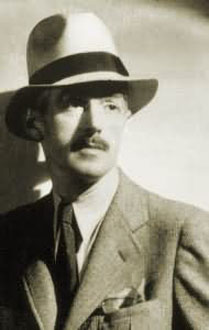 Every Thursday in July, we'll look at some type of hard-boiled, pulp fiction story. Last week: Double Indemnity by James Cain (read it here). This week: Dashiell Hammett/Raymond Chandler
Every Thursday in July, we'll look at some type of hard-boiled, pulp fiction story. Last week: Double Indemnity by James Cain (read it here). This week: Dashiell Hammett/Raymond ChandlerPutting Hammett and Chandler is a disservice to both of them and probably an honor at the same time. But the similarities between the two are hard to ignore, if not just for story purposes. Their stories or at least the ones I have recently become familiar with are different than the crime-noir stuff that comes after--these detectives are just straight-up about finding the facts and winding the tightest knots around those facts. The central characters, Hammett's nameless Continental Op and Chandler's Philip Marlowe are not really death and despair nihilistic guys, rarely asking, "What is the meaning of life?" or "Woe is me" or "Fate has really got me down now." We don't know really know their personalities of the detectives, that's revealed through action over a multitude of stories. Hammett and Chandler don't give us too many physical details, that's usually embedded in the story as well, such as when the Continental Op is trying to squeeze through a small hallway and he makes a reference to his heftiness. Instead, the detectives serve as a weird form of voyeur--a window into the seedy world of where they find themselves, which is of course California. [More after the jump...]

Dashiell Hammett
In the two Hammett stories I read, "The Girl with the Silver Eyes" and "The Scorched Face" both stories were written in the 1920s, so there's not naivete, but there is some shock value. "The Scorched Face" is about two missing daughters who find themselves in some sort of sex cult. In Chandler's "Killer in the Rain," Marlowe finds himself confronted with a similar sexually exploited situation. There is some give and take with the subject matter, for sure--it's titillating, but the establishment of facts and the unwinding of the long coil of relationships is indicative of a time that barely exists any longer--no one is foolish enough to do all their criminal activity in one central locale, surely. It almost seems ridiculous to have one detective figure all of this stuff out--our movies and books these days need teams of collaborators at the highest levels of government.

Raymond Chandler
Perhaps the most frustrating thing in these stories, especially in the second Chandler story I read, "Red Wind," is just how damn lucky Philip Marlowe is. All kinds of characters show up at his door, and he finds the right closet to hide the witnesses and they jump out at the right time. Plus, everyone assumes a different name, so you have to have a notepad nearby just to read it for fun. And for a guy usually stuck in literary fiction, this is a different way of thinking about the world--the story really is a puzzle, it's full of stereotypes, okay, but this is where the stereotypes were made, so it's kind of fresh and new and not really so much of a stereotype anymore. Yeah, there are the loners who populate our pop culture (Jack vs. Sawyer vs. Locke for Lost fans), but it's rare to find a character that just doesn't depend on us liking or trusting them, but they actually do something. It's also funny to see how very sensualized all of this is, how the girls try to get the good detectives to crack. In "The Girl with the Silver Eyes," Elvira/Jeanne tries to play mind games with the Continental Op, forcefully declaring that she's not playing any games with him, that she really loves him just so he won't take her to jail. And more so than in a movie, we really get an idea of the sexual frustration of the Op, his devotion between justice and the physical attraction in a long bit of dialogue that most contemporary writers do not allow anymore. The Op of course throws her against the metal door of the car all the while yelling, "You're pretty as hell" and taking her straight to jail. It's an honesty and dedication to justice that needs to make a comeback. The stereotype has swung the other way--because now it's a cliche that everyone will end up having sex at some point.
Maybe to recant a bit of an earlier statement, it is fun to have all of these crimes happen so local. It makes the reader suspicious of everyone, everything, and empowers us--"Dang it, we can all be detectives if we try hard enough--we don't need a freakin' CIA, what we need is a good roadster, a good highball, and some lucky tips." Not that that's how Nancy Drew and The Hardy Boys did it, but they never faced any moral ambiguity. What Chandler and Hammett makes us realize is that there is all sort of seediness going on in our backyard, we just have to do a bit of gardening to find it.





One of the finest.
ReplyDelete-Ben